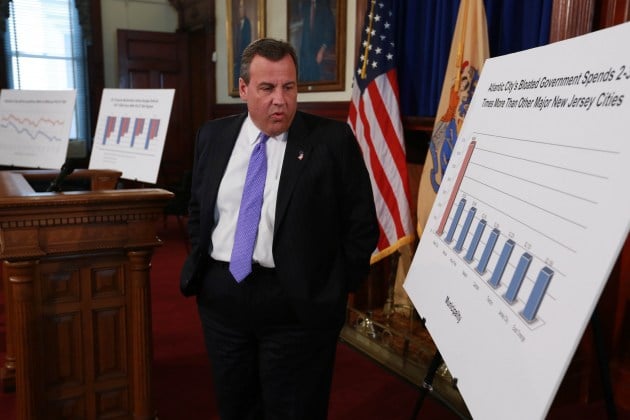New Jersey Governor Chris Christie Calls for Atlantic City Budget Slim Down for Municipal Workers
Posted on: April 1, 2016, 10:20h.
Last updated on: April 1, 2016, 10:43h.
New Jersey Governor Chris Christie is no longer crisscrossing the country on the presidential campaign trail, and as such the Republican, now in his second gubernatorial term, has more time to refocus his efforts on issues facing his own state.

No concern is more paramount in New Jersey right now than Atlantic City’s current financial crisis. On Thursday, Christie told his fellow legislators that it’s in the city’s best interest to allow the state to assume control of its finances.
“Even with the assistance and the advice of the Emergency Manager that we put in place in 2015, Atlantic City took only modest steps to rein in their costs,” Christie said at the statehouse this week. “They face a $100 million budget shortfall this year, $100 million budget deficit this year . . . These are the numbers, this is the math, and these are the facts, and there is no debate about this.”
Park Place & Boardwalk Salaries
In Christie’s arguments, the governor highlighted what he believes to be gross overspending on municipal workers. Armed with charts and graphs, he showed that 119 city employees were paid over $100,000 during the last fiscal year, a sum which doesn’t even include the “Lamborghini-level” healthcare and benefits package that accompanies those salaries.
Christie also stressed the fact that Atlantic City paid $6.6 million in 2015 to retiring public employees, primarily to compensate unused sick and vacation days. Part-time council members were collectively paid $300,000, an expense seen as extravagant in the eyes of the governor.
Unless the state legislature takes action to give control of the flailing gambling mecca to Trenton, Christie says he lacks the power to renegotiate contracts with public sector unions to get the “exorbitant costs of the city work force under control.”
Takeover is the Only Solution
Christie is calling on State Assembly Speaker Vincent Prieto (D) to urge the chamber to quickly pass legislation to hand over control of Atlantic City to the state. Prieto opposes that path, opting in favor of the PILOT (payment in lieu of taxes) program instead.
PILOT would allow casinos to pay taxes on a fixed schedule that isn’t determined on property value or gaming revenues, which have both greatly diminished over the years, as tourism to the area has fallen.
Christie believes the PILOT program is a short-term solution that won’t help Atlantic City’s long-term forecast. Financial analyst outfit Moody’s seems to agree.
“If only the PILOT bill passes [with no other measures instituted], the city will continue to face distress since the single bill is insufficient to restore Atlantic City’s fiscal health,” the credit rating corporation said recently. “While the PILOT bill produces additional revenues and avoids incurring additional casino tax liabilities, it is not enough to avoid crippling deficits of $30 to $40 million a year, over the next five years.”
Christie believes public workers need to step up to the plate in the best interest of their city, but it appears some are already doing that.
After Atlantic City Mayor Don Guardian (R) threatened a city closure of non-essential employees, various unions proposed paying employees every four weeks instead of two, a change that would allow the government to continue operating until the next quarterly tax payments are received on May 1.
But that’s only one month away, so action will need to be taken, and soon.
Related News Articles
Pair Found Guilty in New Zealand Roulette Scam
Paul Phua Pleads Not Guilty in Las Vegas Sports Betting Case, Feds Want $13M
Most Popular
VEGAS MYTHS BUSTED: Golden Gate is the Oldest Casino in Vegas
Las Vegas Overstated F1 Race’s Vegas Impact — Report
Most Commented
-
End of the Line for Las Vegas Monorail
— April 5, 2024 — 90 Comments -
Mega Millions Reportedly Mulling Substantial Ticket Price Increase
— April 16, 2024 — 6 Comments
















Last Comment ( 1 )
Atlantic City is very different from other New Jersey cities, with 40,000 citizens, because it has to provide services and protection to another 100,000 visitors and non resident workers on a daily basis. Like the casinos, the unions were able to earn Cadillac pay and benefit plans for their members, because Atlantic City enjoyed a casino monopoly in the Eastern US. But now the City, unions and employees have to accept reality, because the monopoly is not returning. The corollary is living on welfare and other benefits, much like the pre-casino days. As we were staffing up for the opening of the Resorts International casino, I can remember some of our Chalfonte-Haddon Hall employees complaining about having to work a full 50 weeks a year. They were used to working 3 or 4 months, and then collecting unemployment.